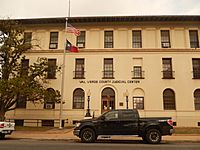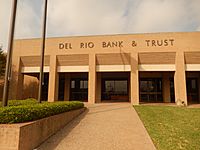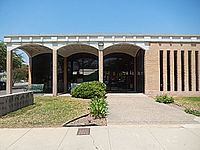Val Verde County, Texas facts for kids
Quick facts for kids
Val Verde County
|
|
|---|---|
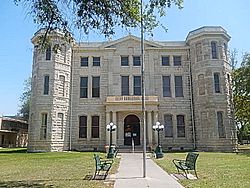
County courthouse
|
|
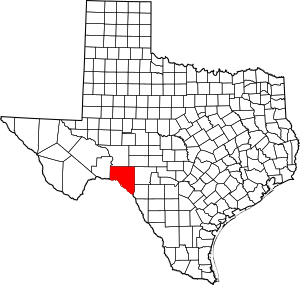
Location within the U.S. state of Texas
|
|
 Texas's location within the U.S. |
|
| Country | |
| State | |
| Founded | 1885 |
| Named for | Battle of Valverde |
| Seat | Del Rio |
| Largest city | Del Rio |
| Area | |
| • Total | 3,233 sq mi (8,370 km2) |
| • Land | 3,145 sq mi (8,150 km2) |
| • Water | 88 sq mi (230 km2) 2.7% |
| Population
(2020)
|
|
| • Total | 47,586 |
| • Density | 14.7188/sq mi (5.6830/km2) |
| Time zone | UTC−6 (Central) |
| • Summer (DST) | UTC−5 (CDT) |
| Congressional district | 23rd |
Val Verde County is a county located on the southern Edwards Plateau in the U.S. state of Texas. The 2020 population is 47,586. Its county seat is Del Rio. The Del Rio micropolitan statistical area includes all of Val Verde County.
Val Verde, which means "green valley", was named for a battle of the Civil War. In 1862, soldiers of Sibley's Brigade took part in the Texas invasion of New Mexico Territory, where they captured several artillery pieces at the Battle of Val Verde. The battle is memorialized both in the name of the county and a small settlement in Milam County.
History
Early history
The first inhabitants of what is now known as Val Verde County lived there some 6,000–10,000 years ago. Their descendants include such Native American peoples as the Lipan Apache, Coahuiltecan, Jumano, Tamaulipan and Comanche.
Colonial rule
In 1590, Spanish explorer Gaspar Castaño de Sosa led a mining expedition of 170 who passed through Devils Draw. He referred to a stream by the name of Laxas, which is believed to be Devils River.
In 1673, Juan Larios opened a mission school at a location between Del Rio and Eagle Pass.
In 1675, traveling Franciscan priests celebrated Mass at San Felipe Springs.
In 1736, Lt. Miguel de la Garza Falcón led 100 soldiers along the Devils River in pursuit of Apache natives.
During 1834, James Grant and John Charles Beales established a settlement on San Felipe Creek, which became hazardous due to Indian attacks.
Aftermath of Mexican-American War
During the 1850s, military bases established to protect against Indian attacks included Camp Blake, Camp Hudson and Camp San Felipe.
As of 1860, the county had a population of 2,874, including 108 blacks and 1,103 foreign-born.
Post-Civil War
During 1868, the San Felipe Del Rio community is established on San Felipe Creek, next to Camp San Felipe.
From 1869 through 1882, Seminole Negro Indian Scouts (mixed heritage Seminoles with African blood) under John Lapham Bullis, namesake of Camp Bullis, defend the Texas border against Indian attacks.
In 1883, the Galveston Harrisburg and San Antonio Railway was completed. Italian immigrant Frank Qualia established Val Verde winery.
In 1884, the Langtry community was established, named after George Langtry (an engineer and foreman). It has mistakenly been attributed to being named after British entertainer Lillie Langtry by Judge Roy Bean.
In 1885, Val Verde County was organized from Crockett, Kinney, and Pecos counties. Roy Bean was elected justice of the peace in Langtry, operating out of the Jersey Lily Saloon and becoming renowned as "the Law West of the Pecos".
In 1886, the Juno and Devils River communities were established.
In 1888, the Comstock community was established.
In 1889, the community of Norris was established.
Twentieth century
- 1928 Lake Hamilton Dam complete.
- 1904 Lillie Langtry visits the community of Langtry.
- 1929 Lake Walk Dam complete.
- 1936 Val Verde County received Recorded Texas Historic Landmark number 5625 to commemorate its founding.
- 1942 Laughlin Field/Laughin Army Air Field opens to train World War II pilots.
- 1945 Laughlin Field closes.
- 1952 Laughlin Field reopens as Laughlin Air Force Base, and serves as a secret U2 unit. Major Rudolf Anderson, a U-2 pilot based out of Laughlin, was the only casualty of the Cuban Missile Crisis.
- 1969 Amistad Dam and Reservoir complete. The project cost $78 million.
Geography
According to the U.S. Census Bureau, the county has a total area of 3,233 sq mi (8,370 km2), of which 3,145 sq mi (8,150 km2) are land and 88 sq mi (230 km2) (2.7%) are covered by water.
Major highways
Adjacent counties and municipios
- Crockett County (north)
- Sutton County (northeast)
- Edwards County (east)
- Kinney County (east)
- Terrell County (west)
- Acuña, Coahuila, Mexico (south)
- Jiménez, Coahuila, Mexico (south)
National protected areas
- Amistad National Recreation Area
- Rio Grande Wild and Scenic River (part)
Demographics
| Historical population | |||
|---|---|---|---|
| Census | Pop. | %± | |
| 1890 | 2,874 | — | |
| 1900 | 5,263 | 83.1% | |
| 1910 | 8,613 | 63.7% | |
| 1920 | 12,706 | 47.5% | |
| 1930 | 14,924 | 17.5% | |
| 1940 | 15,453 | 3.5% | |
| 1950 | 16,635 | 7.6% | |
| 1960 | 24,461 | 47.0% | |
| 1970 | 27,471 | 12.3% | |
| 1980 | 35,910 | 30.7% | |
| 1990 | 38,721 | 7.8% | |
| 2000 | 44,856 | 15.8% | |
| 2010 | 48,879 | 9.0% | |
| 2020 | 47,586 | −2.6% | |
| U.S. Decennial Census 1850–2010 2010 2020 |
|||
| Race / Ethnicity (NH = Non-Hispanic) | Pop 2000 | Pop 2010 | Pop 2020 | % 2000 | % 2010 | % 2020 |
|---|---|---|---|---|---|---|
| White alone (NH) | 9,734 | 8,548 | 7,836 | 21.70% | 17.49% | 16.47% |
| Black or African American alone (NH) | 609 | 563 | 538 | 1.36% | 1.15% | 1.13% |
| Native American or Alaska Native alone (NH) | 129 | 86 | 57 | 0.29% | 0.18% | 0.12% |
| Asian alone (NH) | 235 | 207 | 351 | 0.52% | 0.42% | 0.74% |
| Pacific Islander alone (NH) | 12 | 37 | 35 | 0.03% | 0.08% | 0.07% |
| Other race alone (NH) | 29 | 29 | 85 | 0.06% | 0.06% | 0.18% |
| Mixed race or Multiracial (NH) | 259 | 210 | 477 | 0.58% | 0.43% | 1.00% |
| Hispanic or Latino (any race) | 33,849 | 39,199 | 38,207 | 75.46% | 80.20% | 80.29% |
| Total | 44,856 | 48,879 | 47,586 | 100.00% | 100.00% | 100.00% |
As of the census of 2000, 44,856 people, 14,151 households, and 11,320 families resided in the county. The population density was 14 people per square mile (5.4 people/km2). The 16,288 housing units averaged 5 units per square mile (1.9 units/km2). The racial makeup of the county was 76.36% White, 4.54% African American, 0.68% Native American, 0.55% Asian, 0.05% Pacific Islander, 18.22% from other races, and 2.60% from two or more races. About 75.5% of the population was Hispanic or Latino of any race.
Of the 14,151 households, 42.90% had children under the age of 18 living with them, 62.50% were married couples living together, 13.90% had a female householder with no husband present, and 20.00% were not families. About 17.50% of all households were made up of individuals, and 7.50% had someone living alone who was 65 years of age or older. The average household size was 3.11 and the average family size was 3.55.
In the county, the population was distributed as 32.10% under the age of 18, 9.40% from 18 to 24, 27.90% from 25 to 44, 19.60% from 45 to 64, and 11.00% who were 65 years of age or older. The median age was 31 years. For every 100 females, there were 97.00 males. For every 100 females age 18 and over, there were 93.20 males.
The median income for a household in the county was $28,376, and for a family was $31,434. Males had a median income of $26,485 versus $18,039 for females. The per capita income for the county was $12,096. About 22.10% of families and 26.10% of the population were below the poverty line, including 33.80% of those under age 18 and 26.40% of them age 65 or over.
Education
School districts include:
- Comstock Independent School District
- Rocksprings Independent School District
- San Felipe-Del Rio Consolidated Independent School District
Sometime prior to 1976 the Comstock district absorbed the Langtry and Pandale common school districts. The former Juno Common School District consolidated into Comstock ISD in 1992. There was formerly a Star Route School on Miers Ranch. In 1964 the school had 13 students.
Southwest Texas Junior College is the designated community college for the county.
The Val Verde County Library in Del Rio serves the county.
Communities
City
- Del Rio (county seat)
Census-designated places
- Amistad
- Box Canyon
- Cienegas Terrace
- Lake View
- Laughlin Air Force Base
- Val Verde Park
Former census-designated places
Unincorporated communities
Ghost town
- Pumpville
Notable people
- Judge Roy Bean
See also
 In Spanish: Condado de Val Verde para niños
In Spanish: Condado de Val Verde para niños


